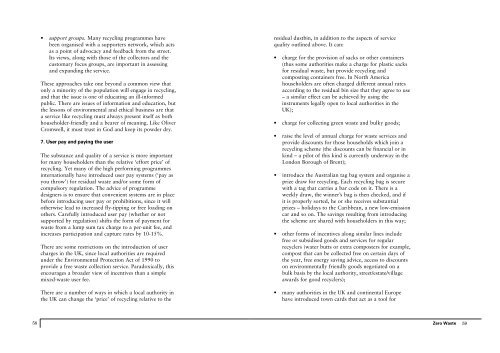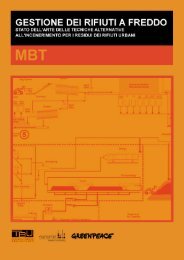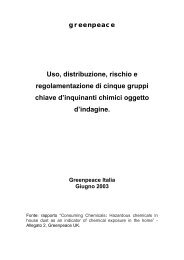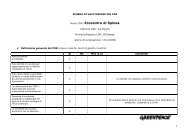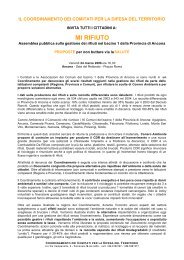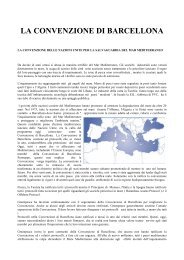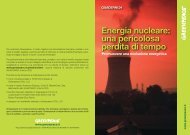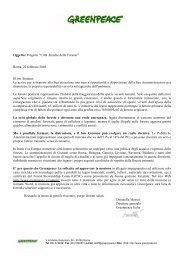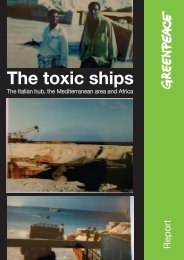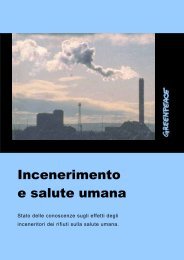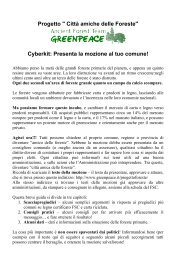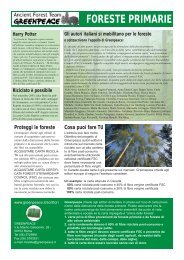Zero Waste by Robin Murray, Greenpeace Environmental Trust 2002
Zero Waste by Robin Murray, Greenpeace Environmental Trust 2002
Zero Waste by Robin Murray, Greenpeace Environmental Trust 2002
Create successful ePaper yourself
Turn your PDF publications into a flip-book with our unique Google optimized e-Paper software.
• support groups. Many recycling programmes have<br />
been organised with a supporters network, which acts<br />
as a point of advocacy and feedback from the street.<br />
Its views, along with those of the collectors and the<br />
customary focus groups, are important in assessing<br />
and expanding the service.<br />
These approaches take one beyond a common view that<br />
only a minority of the population will engage in recycling,<br />
and that the issue is one of educating an ill-informed<br />
public. There are issues of information and education, but<br />
the lessons of environmental and ethical business are that<br />
a service like recycling must always present itself as both<br />
householder-friendly and a bearer of meaning. Like Oliver<br />
Cromwell, it must trust in God and keep its powder dry.<br />
7. User pay and paying the user<br />
The substance and quality of a service is more important<br />
for many householders than the relative ‘effort price’ of<br />
recycling. Yet many of the high performing programmes<br />
internationally have introduced user pay systems (‘pay as<br />
you throw’) for residual waste and/or some form of<br />
compulsory regulation. The advice of programme<br />
designers is to ensure that convenient systems are in place<br />
before introducing user pay or prohibitions, since it will<br />
otherwise lead to increased fly-tipping or free loading on<br />
others. Carefully introduced user pay (whether or not<br />
supported <strong>by</strong> regulation) shifts the form of payment for<br />
waste from a lump sum tax charge to a per-unit fee, and<br />
increases participation and capture rates <strong>by</strong> 10-15%.<br />
There are some restrictions on the introduction of user<br />
charges in the UK, since local authorities are required<br />
under the <strong>Environmental</strong> Protection Act of 1990 to<br />
provide a free waste collection service. Paradoxically, this<br />
encourages a broader view of incentives than a simple<br />
mixed-waste user fee.<br />
There are a number of ways in which a local authority in<br />
the UK can change the ‘price’ of recycling relative to the<br />
residual dustbin, in addition to the aspects of service<br />
quality outlined above. It can:<br />
• charge for the provision of sacks or other containers<br />
(thus some authorities make a charge for plastic sacks<br />
for residual waste, but provide recycling and<br />
composting containers free. In North America<br />
householders are often charged different annual rates<br />
according to the residual bin size that they agree to use<br />
– a similar effect can be achieved <strong>by</strong> using the<br />
instruments legally open to local authorities in the<br />
UK);<br />
• charge for collecting green waste and bulky goods;<br />
• raise the level of annual charge for waste services and<br />
provide discounts for those households which join a<br />
recycling scheme (the discounts can be financial or in<br />
kind – a pilot of this kind is currently underway in the<br />
London Borough of Brent);<br />
• introduce the Australian tag bag system and organise a<br />
prize draw for recycling. Each recycling bag is secure<br />
with a tag that carries a bar code on it. There is a<br />
weekly draw, the winner’s bag is then checked, and if<br />
it is properly sorted, he or she receives substantial<br />
prizes – holidays to the Caribbean, a new low-emission<br />
car and so on. The savings resulting from introducing<br />
the scheme are shared with householders in this way;<br />
• other forms of incentives along similar lines include<br />
free or subsidised goods and services for regular<br />
recyclers (water butts or extra composters for example,<br />
compost that can be collected free on certain days of<br />
the year, free energy saving advice, access to discounts<br />
on environmentally friendly goods negotiated on a<br />
bulk basis <strong>by</strong> the local authority, street/estate/village<br />
awards for good recyclers);<br />
• many authorities in the UK and continental Europe<br />
have introduced town cards that act as a tool for<br />
58<br />
<strong>Zero</strong> <strong>Waste</strong><br />
59


